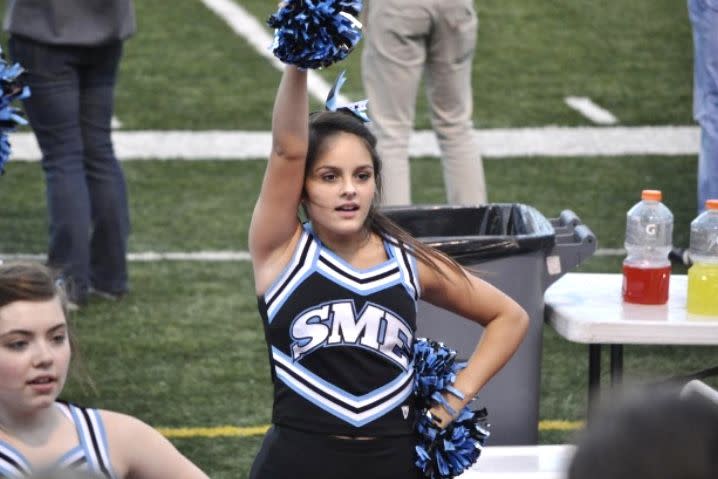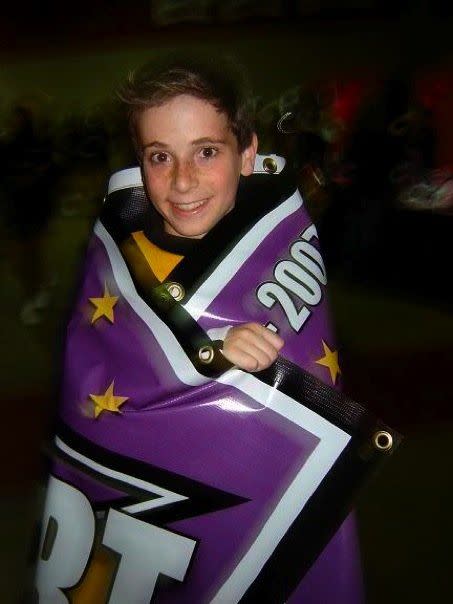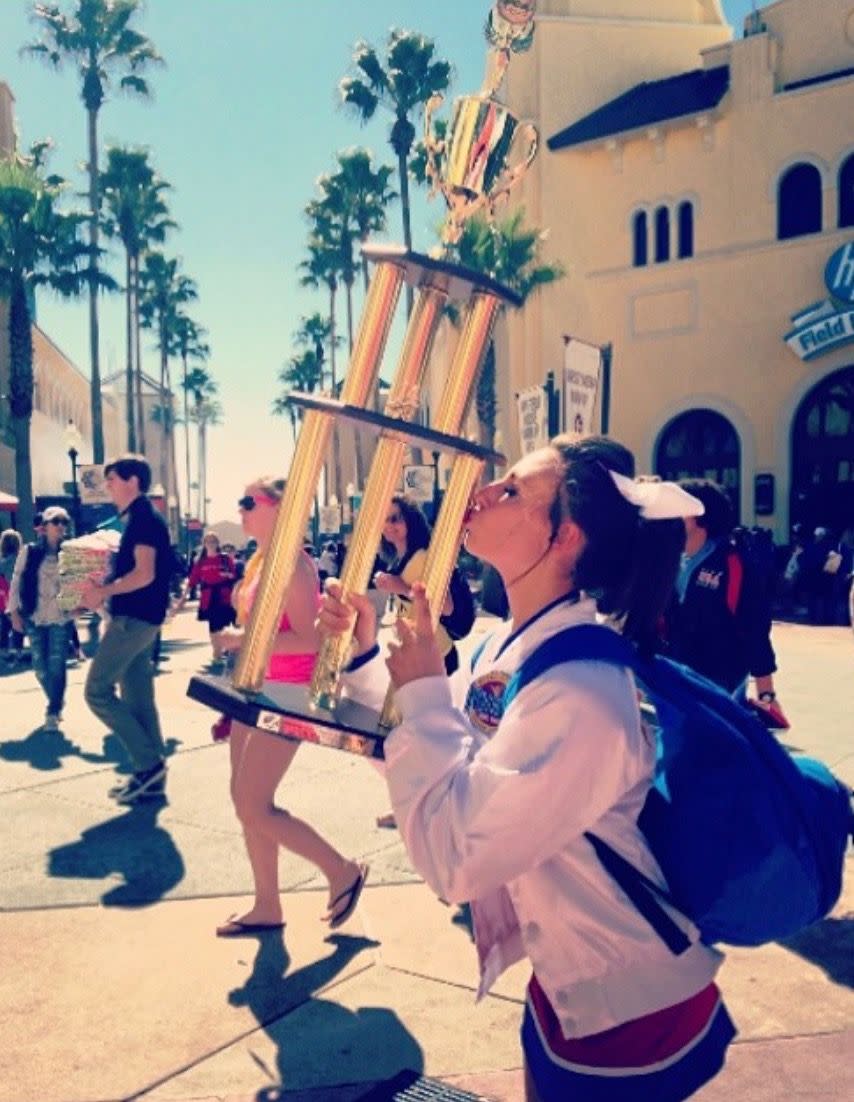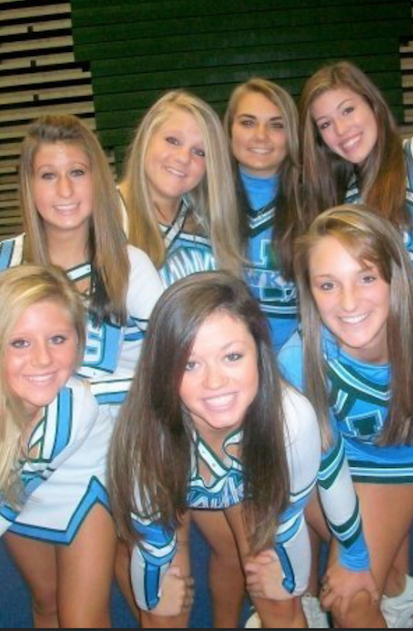'Where Did My Pinky Go?' Real-Life Cheerleaders on Their Competition Horror Stories

It's been three weeks since Netflix's Cheer herkied into our hearts, and it's still all anyone can talk about. I mean, have you truly recovered from Jerry's reaction to making mat?
In case you haven't binged the docuseries yet (and Reese Witherspoon recommends you do), filmmaker Greg Whiteley follows Navarro College's ultra-competitive cheerleading team as they train to defend their title at the National Cheerleading Championship. The show has everything: a Tami Taylor-type leader in coach Monica Aldama, small town hopes for a big time trophy, and, of course, gravity-defying stunts involving towers of perfectly-toned human bodies.
Part of what makes Cheer so great is the squad's unabated love for the sport of cheerleading. No matter how nasty the fall—or how wild the drama—they'll do anything to perfect those two minutes and 15 seconds of routine. In this, they're not alone: Competitive cheerleaders are among the most dedicated athletes in all of sports. Come concussion or cracked rib, the show must go on. ELLE.com spoke with seven current and former cheerleaders about their own crazy experiences on the mat.
'She peed on me!' – Maddie McDonald, 23

"When I was in 8th grade doing competitive cheer, my flyer had to pee badly, but my coach made us do one last full-out before she could go. Unfortunately, I was her main base. She peed on me! The back spot got the brunt of the pee though, and it went all over her shirt. We mostly got it on our arms when we were catching her in the cradle. I don't remember our coach apologizing. I'm sure she did, subtly, but our team was pretty hardcore. The coach didn't ever apologize, even if you broke your arm. The flyer, however, did apologize to us profusely and was extremely embarrassed, as you can imagine. It was the last run-through of the practice before conditioning, so we got to skip that day while we were in the bathroom cleaning ourselves."
'Where did my pinky finger go?' – Kelsey McDowell, 27

"I'd been cheering since the 3rd grade and been to many cheer camps over the years, so thought I had a good idea of what to expect during my first semester cheering at Missouri Baptist University in St. Louis. At some point on the very first day, we jumped into stunting. Everything was pretty standard—I'd been a back spot for years and was very confident in my technical skills. An older girl on the squad who was also a back spot advised that I use a different technique whenever my flyer was returning to a "sponge," which is coming back down to the starting position before going back up in the air. I'd been trained to always keep my hands on my flyer's legs or ankles, but she said I should catch her by the butt. Imagine: Sending a girl up in the air, then removing your hands from her ankles, where you had just been putting in the effort to stabilize the stunt, and moving to catch her butt that's quickly descending toward your face. You don't need a Physics 101 class to realize what a terrible idea this is. Yet, I did it. I thought maybe things in collegiate cheerleading were just…different?
"We sent my flyer up in the air and as she was making her descent, I moved my hands to cradle her butt that was now flying toward my face. She pushed all of her weight back and the next thing I knew, I was in excruciating pain. I looked down at my hand and could only see four fingers. Where did my pinky finger go? Like, it was completely gone. I looked on the floor and it wasn't there. I turned my hand over and there it was, hanging limply by the skin, no longer connected to my hand. I looked at my bases and said, "Let's try it again." Yes, that's how desperate I was to fit in. So, we tried it again. At this point, they hadn't noticed my bizarre injury. I didn't say anything to them and slipped away to quietly mention it to my coach. Then, I called my mom and she took me to the emergency room. They told me they were shocked I wasn't screaming in pain.
"I went back to camp that night totally drugged up, learned a routine on my own to keep up with what I had missed, and performed with the squad that next week. The show must go on! [Then] I had a surgery to stabilize the finger, which included pins protruding from my hand, a cast that went nearly up to my elbow, and nearly six months of "pinky therapy," which consisted of squishing tough putty and a physical therapist taking measurements of the angles I could make with my pinky. Thus ended my collegiate cheerleading career."
'I put my life on the line for cheer, literally.' – Lakyn Brozo, 24

"I was born with a congenital heart defect called transposition of the great arteries, which required life-saving open heart surgery when I was just eight days old. I didn't let that stop me from being active; I grew up doing gymnastics and transitioned to cheerleading at the age of 10. It was frightening going from a sport in which I solely depended on myself for success to one where I had to have implicit trust in my teammates. Up to then, my entire life hinged on keeping my heart safe. [Now] I constantly pushed the limits to obtain skills and achieve perfect performances—all at the hands of others. I put my life on the line for cheer, literally.
"Because of my heart defect, I'm physically on the smaller side. Because of my heart defect, I'm also fearless. That combination—small and fearless—makes a perfect top girl. I loved the thrill of flying through the air, but with every landing came the jolting thought that, if I was not caught correctly, I could suffer a life-threatening injury. I also had concerns about how hard I was pushing my cardio. When I get my heart rate up, my blood pumps faster, which makes my already hard-working heart work even harder. Several minutes of cardio may not seem tough, but for me, stunting, dancing, jumping, riding tosses, and tumbling was pushing the limits. There were times when I would leave the floor gasping for breath. My recovery time was alarming.
"People ask me why would I push myself so much, and put myself in such a dangerous situation. It was my teammates. Those girls had my back. Those girls made sure I was caught the right way. They sat with me after each performance to calm me down until my breathing was back on track. On the mat we all became one. It may be a mentality that only competitive cheerleaders can comprehend. Would I do it all again? In a heart beat."
'I vomited on my uniform mid-routine.' – Connor Cook, 25

"It’s quite common for cheerleaders to vomit mid- or post-routine because of the intense physical activity and flipping and spinning mixed with adrenaline and nerves. Our middle school team made it to the World Championships in 2008, and I vomited on my uniform mid-routine. Basically, I pulled the neck away and vomited down my chest right before I did my main tumbling pass. Our routine was going really well, and usually if you vomit on the floor, they stop the music and make you restart due to safety issues. I knew we were doing great, so I figured I’d take one for the team!
"But it doesn't stop there. I kind of mastered the art of vomiting on command, and used to do it in practice when I was too tired to continue. Once or twice, I intentionally vomited in the middle of the floor so my coach would be forced to stop and clean it up. Right before big competitions we did full-out routines back to back to back during practice. After each routine, you literally feel as if you are going to die—but you're told to get up and do it again. Hence the vomiting on command."
'We head-butted on the mat.' – Brittany Pearson, 23

"When I was doing All-Star cheer in Texas for Cheer Station on a Level 4 team, we made it to NCA (National Cheerleading Association) Nationals, one of the biggest competitions aside from UCA Nationals, Daytona and Worlds. When it came to the running tumbling section of our routine, we were exhausted. My tumbling mate Macy and I were tumbling together diagonally across the mat. We went into our roundoff, then a back handspring, whip, flip flop. Everything was in sync—until we went into our layouts and collided. We hit each other’s heads in the middle of our layouts while flipping. We both got concussions in that moment—and we both knew it—but as soon as we stuck our pass, we smiled and moved onto the pyramid. We were both so dizzy and nauseous. We didn't know if we'd make it through, but we had to keep going. We had to do it for our team. We couldn’t let them down, we couldn’t let our coaches down, and, ultimately, we couldn’t let ourselves down. We work all year, several practices a week, multiple open gyms to perfect our skills, and as cheerleaders, we do not let any mistake or injury set us back during our 2 minute and 30 second routine. We just keep going."
'My punishment was to run two miles.' – Made Lapuerta, 21
this is my part nobody else speak
A post shared by MADE (@yoyo.made) on Oct 8, 2016 at 4:58pm PDT
"I'm a cheerleader for Harvard University. On our team, the understanding is that you come to all practices and games on time so that your stunt group can go up. Last semester, I woke up from an afternoon nap right before that night's cheerleading practice was about to start. My team has a very strict policy against being even one second late, so I frantically got up and threw on some workout clothes, beating myself up for stupidly forgetting to set an alarm. I sprinted across the river to the indoor track where we practice, knowing that arriving late could result in me sitting out of that weekend's football game. I managed to make it to the mat before any stunting had started, but I was still late and had to suffer the consequences.
"My punishment was to run two miles after practice. It's an understanding we all have on the team, so I didn't even need my coach to tell me. Sure, I was frustrated, especially because I was already tired from practice, but it taught me to do my best for our teammates."
'We showed up looking like we had slept in the dirt.' – Hope Tanner, 26

"As I’m sure a majority of cheerleaders say about their coaches, in high school we had a psycho coach. Most of our competition team was also on the varsity sideline cheering team, so on Friday nights we all had a slumber party after the game. Due to the stress we endured weekly and the verbal abuse we knew was in store the following morning -98during competition practice, we decided to have a little bit of fun. We set up tents outside and drank some “magic juice." After one too many cups of juice, things took a turn. One girl ended up getting naked and jumping on the trampoline and peed all over herself. Some girls got lost in the field close to where we were staying. A few besties on the team were exposed for supposedly sleeping with each other's crushes.
"We woke up in the morning with the worst hangovers. Somehow we made it to practice, which was ironically a very important practice. We were supposed to be doing our entire routine full out, since it was five days before our biggest competition. We showed up looking like we had slept in the dirt. If you weren’t hungover, then you were most definitely leftover drunk. Let's just say our performance showed. Every stunt fell. Girls were running to the bathroom puking. The still-drunk ones couldn’t stop giggling. Our coach flipped out and kept making us run laps, which only caused more vomiting. During that practice, our two main bases got concussions, one of our flyers had a slipped disc, and another girl broke her elbow. Panic ensued, as we realized we basically had to re-work our entire routine. We had to teach our two alternates the entire routine, plus two other girls from our normal sideline team who had no competition cheering experience. It was too much for our coach, who ended up quitting and moving to another state after our final competition."
These interviews have been lightly edited and condensed for clarity.
You Might Also Like

 Yahoo News
Yahoo News 
